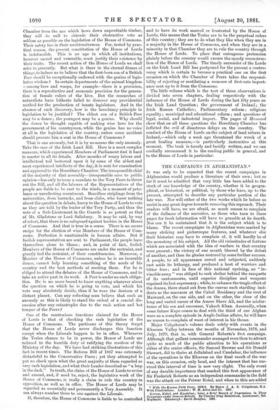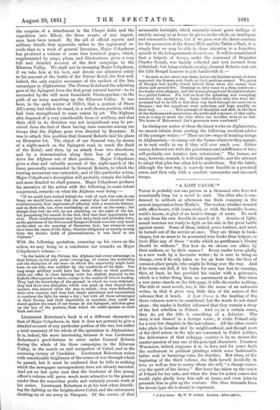THE CAMPAIGNS IN AFGHANISTAN.* IT was only to be expected
that the recent campaigns in Afghanistan would produce a literature of their own ; but so far it must be admitted that very little has been added to the stock of our knowledge of the country, whether it be geogra- phical, or historical, or political, by those who have, up to the present, attempted to describe any particular portion of the late war. Nor will either of the two works which lie before us assist in any great degree towards removing this reproach. Their readers will have, we are afraid, as much reason to complain of the dullness of the narrative, as those who turn to these pages for fresh information will have to grumble at its dearth. Nor can it be maintained that it is the subject which is to blame. The recent campaigns in Afghanistan were marked by many striking and picturesque features, and whatever else their historian may have to complain of, it will hardly be of the monotony of his subject. All the old vicissitudes of fortune which are associated with the idea of warfare in that country were present ; the victory of one month blurred by the defeat of another, and then its glories restored by some further success. A people, to all appearance cowed and subjected, suddenly cast aside its lethargy, and produced a host of warriors and bitter foes ; and in face of this national uprising, an "in- vincible army" was obliged to seek shelter behind the ramparts of its cantonments, until superior discipline and weapons regained its lost supremacy ; while, to enhance the tragic effect of the drama, there stand out from the canvas such startling inci- dents as the massacre at the Cabal Residency and the rout of Maiwand, on the one side, and on the other, the close of the long and varied career of the Ameer Shere Ali, and the misfor- tunes of his son and successor, Yakoob Khan. Assuredly, when some future Kaye comes to deal with the third of our Afghan wars as a complete episode in Anglo-Indian affairs, he will have no reason to complain of want of interest in his theme.
Major Colquhoun's volume deals solely with events in the Khurum Valley between the months of November, 1878, and July, 1879, that is, with General Roberts's first campaign. Although that gallant commander managed even then to attract quite as much of the public attention to his operations as either of the senior officers, Sir Samuel Browne and Sir Donald Stewart, did to theirs at Jellalabad and Candahar, the influence of the operations in the Khurum on the final result of the war was, on this occasion, only local, and the interest that has sur- vived this interval of time is now very slight. The only event of any durable importance that marked this first appearance of Sir Frederick Roberts as an independent commander in the field was the attack on the Peiwar Kotal, and when to this are added
• With the Kurum Field Forge, 1878-9. By Major J. A. 8. Colunhoun, With Illustrations. London : W. H. Allen and Co. 1881.
Karam, Kabul, and Kandahar; being a Brief Record of Impressions in Three Campaigns under General Roberts. By Charles Gray Robertson, Lieutenant, 8th Regiment. Edinburgh : David Douglas. 1891.
the surprise of a detachment in the Chapri defile and the expedition into Khost, the three events of any import_ mice have been named. By the aid of official reports and military details that appertain rather to the regimental re- cords than to a work of general literature, Major Colquhoun has produced a volume of some four hundred pages, which, supplemented by maps, plans, and illustrations, gives a very full and detailed account of the first campaign in the Khurum Valley. We shall not be wronging Major Colquhoun, if we take him at his best, and devote our attention solely to his account of the battle of the Peiwar Kotal, the first and, indeed, the only regular encounter of the earliest of the late campaigns in Afghanistan. The Peiwar Kotal and the adjoining pass of the Spingawi form the first great natural barrier—to be succeeded by the still more formidable Shutargurdan—in the path of an army marching up the Khurum Valley. It was here, in the early winter of 1878-9, that a portion of Shere All's army had taken its stand, in a well-chosen position, which had been strengthened to some extent by art. The Afghans also disposed of a very considerable force of artillery, and that their skill in its direction was not insignificant may be per- ceived from the fact of there having been rumours among our troops that the Afghan guns were directed by Russians. It was to attack this position that General Roberts laid his plans on December 1st. The object of our General was, by means of a night-march on the Spingawi road, to reach the flank of the Kotal; and then, by an attack from two directions, and by a demonstration along their line of retreat, to drive the Afghans out of their position. Major Colquhoun gives a clear and valuable account of the night-march of the force, personally commanded by General Roberts, to which the turning movement was entrusted ; and of this particular action, Major Colquhonn's description will probably remain the fullest and most detailed we shall possess. Major Colquhoun prefaces
his narrative of the action with the following, to some extent conjectural, remarks on what the Afghans were doing :— "If we could have looked behind the wall of rock that rose in our front, we should have seen that the enemy also had received their reinforcements, four regiments of infantry, with a mountain battery, and on their side, too, were meditating an attack on the camp ; but though they had the will, by not attacking on the night of the 1st, but postponing the assault to the 2nd, they lost their opportunity for ever. Their reinforcements may have been tired, and probably were, as the garrisons of the Peiwar and Spingawi Botals were not very much on the alert on the morning of December 2nd ; bat whatever may have been the cause of the delay, whether obligatory or merely arising from the Asiatic habit of procrastination, it was fatal to the Afghans."
With the following quotation, summing up his views on the action, we may bring to a conclusion our remarks on Major Colquhoun's volume :—
"In the battle of the Peiwar, the Afghans had every advantage in their favour, as the only point—excepting, of course, the leadership and the discipline of our men—in which the superiority might have been on our side, was nullified by the conditions of the fight. Our long-range artillery could have but little effect on their position, while our rifles in close fighting were but slightly superior to the Enfield rifles opposed to them, except in the matter of breech-loading. They had the knowledge of the ground, in which we were deficient ; they had their own discipline, which was good, as they obeyed their leaders, who showed them the way to attack ; they were defending their own country, and they bad ample provisions and ammunition to continue the fight for many a day ; but with all these advantages in their favour, and their superiority in numbers, they could not stand against the onset of our troops at the Spingawi, and thus gave us the key of the position, from which we could operate on their flank and rear."
Lieutenant Robertson's book is of a different character to that of Major Colquhoun, in that it does not pretend to give a detailed account of any particular portion of the war, but rather a brief summary of the whole of the operations in Afghanistan. It is, indeed, the more interesting, because it was Lieutenant Robertson's good-fortune to serve under General Roberts during the whole of his three campaigns, in the Khurum Valley, in the march on and occupation of Cabul, and in the crowning victory of Candahar. Lieutenant Robertson writes with considerable brightness of the scenes of war through which he passed, but it must be confessed that he tells us nothing which the newspaper correspondents have not already narrated.
And yet we feel quite sure that the freshness of this young officer's volume will prove much more attractive to the general reader than the somewhat prolix and certainly prosaic work of his senior. Lieutenant Robertson is at his best when describ- ing the fighting on the heights above Cabal, and the subsequent shutting-up of our army in Sherpore. Of the events of that memorable fortnight, which naturally raised grave feelings of anxiety among us at home, he gives, on the whole, an intelligent and consecutive history, but if we pass over the fierce combats for the possession of the Asmai Hills and the Takht-i-Shah, it is simply that we may be able to draw attention to a forgotten episode in the beleaguerment of our fc rce. It will be remembered that a brigade of troops, under the command of Brigadier Charles Gough, was hastily collected and sent forward from Jellalabad ; but being without cavalry, General Roberts sent out the 12th Bengal Lancers to join hands with it:—
" As soon as the D1OOR was down, before the faintest streak. of dawn. appeared, the Sowers rode forth on their perilous errand. The gates of Sherpur had hardly closed behind them when the enemy took alarm and opened fire. Pressing on, they came to a deep water-cut; the banks were slippery, and the horses plunged and floundered about. in a pitiful fashion. For half an hour the splashing and trampling. attracted the enemy's fire. Some half-a-dozen men who were dis- mounted had to be left to find their way back through the sentries to Sherpur ; but the squadrons were unbroken, and kept steadily on their way This triumph of discipline and skill, in the face- of the darkness and uncertainty, the perils and exposure, of that night,. was as a sign to mark the time when our troubles were at an end. The hours of Mahommed Jan's greatness were numbered."
In closing our notice of these the latest works on Afghanistan,. we cannot refrain from quoting the following excellent advice of the younger writer :—" There are two ways of treating risings in Afghanistan,—to stamp out the flames wherever they appear,. or to wait coolly to see if they will ever reach you. Either- course, followed out with the persistence and indifference of fate, will probably cow Asiatics into submission." The former, we may, however, remark, is well-nigh impossible, and the attempt to adopt that plan has often led to misfortune. But the latter,. although the true way, is scarcely more feasible in a practical sense, and then only with a resolute commander and seasoned. troops.































 Previous page
Previous page